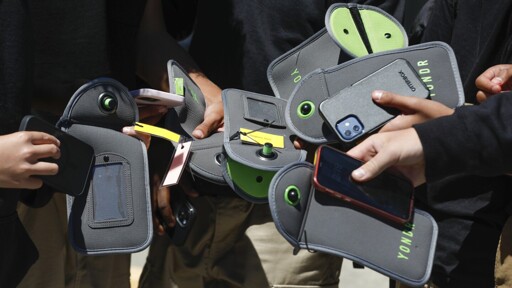Summary
Cellphone bans in schools are gaining bipartisan momentum, with at least eight states, including California, Florida, and Virginia, enacting restrictions to combat classroom distractions and protect children’s mental health.
Governors from both parties, such as Arkansas’ Sarah Huckabee Sanders and California’s Gavin Newsom, support these measures, citing benefits of phone-free school days.
While some parents oppose bans, citing emergencies and transportation needs, proponents argue phones disrupt learning and may pose risks during crises.
States differ on implementation, from outright bans to district-level policies or funding for phone storage solutions.



I was a teacher for a few years but tapped out and got back into the real world. My partner is a teacher. My ex is a tutor and former teacher.
Based on those experiences - cellphones are a menace. They always were, and always will be. Technology in the classroom should rarely be in the hands of students, and if it is in their hands, it should be made such that it cannot access the internet or anything non-educational. That’s an absolute.
More importantly, we need parents to enforce these rules as moral bases. We shouldn’t be distracting babies with screens when they’re yelling and screaming. We shouldn’t be letting kids have ‘screen time’ without clear supervision or with any form of internet content. We need parents who actually do the job, because as we become more reliant on technology it’s gone from the TV Babysitter to the TV Parent to the Internet Parent. That’s no way to live, to be educated, or to understand the world around you.
These statewide and district-wide bans and solutions are important. But what I think would be more important would be for there to be fines. Take it easy on the kid, but any time they’re distracted by their phone or other electronic device, that’s a $100 ticket issued to the parents. Misuse of school property?$500 ticket, and a bill for the cost of the device since it potentially has to be scrapped. I bet that if we did that, parents would send far, far fewer phones to school and make sure the kids only use school computers for school.
I like this, it seems like a very practical approach that takes on the root issue. Parents need to address their kids’ conduct in school, it can’t solely be on the teachers and staff.
Just to play devil’s advocate; what if the parents ultimately refuse to pay the fines?
Same as with any fine related to a kid. CFS gets involved, and the parents get jailed.
Well Jesus fuck this escalated quickly.
I don’t see how it’s that quick an escalation. When someone doesn’t or can’t pay assessed fines, they go to jail. That’s just how our wealth-based justice system works. When those fines involve children, CFS/DYFS needs to get involved.
I’m also responding to the question of “ultimate refusal”, that’s not just one or two screwups, or referring anyone with a willingness to try and find a way to reduce the fines with community service time (like say, chaperoning a field trip for their kids’ classes) or the like. This is working against someone who’s planted their feet, refuses to be a good parent to their child, and refuses to pay in to the system which will inevitably have to try and clean up the mess they’re making of this tiny human’s social and mental state when that minor becomes a person.
If the parents legitimately can’t pay, then have them volunteer for the school. Let them see the consequences of their actions first-hand.